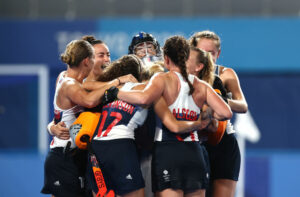How to win a penalty shootout: GB Hockey and UKSI Performance Data
Anyone who watched Team GB win Women’s Hockey gold for the first time in their history at Rio 2016 will know how important penalty shootouts can be. Here, Amber Luzar – UK Sports Institute Data & Insight Lead with England & GB Hockey – explains how insight from performance data was used to prepare athletes for the most testing of match situations, this time at Tokyo 2020.
Coming into Tokyo 2020 as defending champions, part of GB Hockey’s preparations for the Games was a data analysis collaboration with the UK Sports Institute Performance Data Team, in order to generate insight from performance data.
Ultimately that bore fruit as GB Women won a dramatic quarter-final against Spain on penalties, en route to claiming a bronze medal. So how did the we help them get to that point?

Penalty Shootout Performance
To ensure we were approaching our preparation for Tokyo 2020 based on the evidence, the coaches and I got our heads together and came up with some performance questions that we thought data could help to answer.
Those questions were:
- Which performance variables are more likely to lead to a goal during a penalty shootout?
- What is the threshold of conversion that leads to an overall shootout win?
- What is the best penalty taker order to use?
- If we win the coin toss, should we go first or second?
Project Approach
We teamed up with the UK Sports Institute Performance Data Team to carry out the analysis. A mix of approaches was used to statistically analyse the data, as follows:
- First, an analysis was undertaken on each performance variable and their impact on the goal outcome. A Chi-Squared test highlighted any significant relationships between the variables.
- Secondly, a correlation matrix was generated to identify whether there was a statistical association between fields in the dataset.
- Finally, a logistic regression model was built to determine the most important factors for discriminating between penalties being scored or not.
Short and sharp weekly check-in meetings were used throughout the project and allowed for scope adjustments to maximise performance impact. Staying close to the analysis as the project progressed helped me to plan how the new insight would be transferred into a performance setting.
Insights for How to Win a Penalty Shootout
Exploring our questions using robust statistical methods provided an evidence base for our shootout preparation and strategy at the Games.
We gained the following new insight:
- An understanding of the type of skills that are more likely to lead to success, shaping our training in the build-up to Tokyo for both our shootout taker and goalkeeper.
- Thresholds for conversion gave us data-driven training targets which enhanced athlete confidence and supported shootout taker selection.
- Evidence-based decisions on our shootout taker order.
- Support in our mental preparation around shootout mindset – particularly with regard to winning the coin toss.
The depth of the data used in this project also allowed us to perform an opposition analysis of shootout takers and goalkeepers, to further support our athletes based on data trends.
The insight gained underpinned GB Hockey’s shootout strategy for Tokyo 2020, which proved just as important for GB Women as it had at Rio 2016. In that quarter-final shootout, GB goalkeeper Maddie Hinch saved all four of Spain’s attempts to send her side through to the last four and another medal.
You can find out more information about the UK Sports Institute Performance Data Team and view current Performance Data vacancies at the UK Sports Institute.